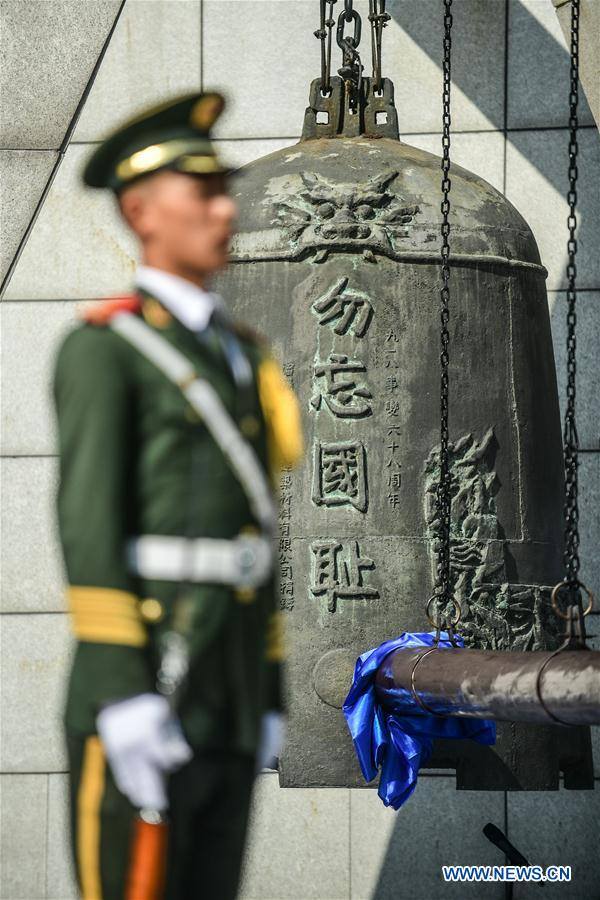


Today is September 18. Many Chinese cities have signaled air defense warnings. To a man from northeast China, this day marks a past of humiliation. To an ordinary Chinese person, this day marks the first day Imperial Japanese Army invaded China during the WWII. To the rest of the world, this day marks the first battle of anti-fascist movement in the Far East.
On September 18, 1931, the Japanese Army blew up and destroyed a section of the railway near Liutiaohu and then accused the Chinese military of causing the explosion. Using this as a pretext, the Japanese then bombarded Shenyang and began their invasion of northeast China.

Many people are not familiar with the "September 18 Incident." Others who barely know about the incident seldom put it into a historical context of the WWII. In fact, Japan's invasion of northeast China was not just about Sino-Japan relations or Sino-Japanese War. It was a key move of Japan's carefully calculated scheme to "conquer" the whole world. After the "September 18 Incident," the fact that Japan had gained control of northeast China broke the old pattern of the international relations.
As a result of the appeasement policy, countries including China kept making compromises which led to the nightmare of the eastern battlefield. When the Japanese invaders launched the Pacific War, Japan had reached a point of no return. China was therefore devastated. The Allies also suffered serious defeats at Pearl Harbor, Hong Kong, and the battlefields in Southeast Asia. Thousands of Allies’ soldiers were captured and enslaved by the Japanese Army. There were no bystanders in the anti-fascist war. The Allies experienced the severe aftermath of indulging the Japanese invaders.

The updated history book used by our primary and middle schools brought the concept of “14 years of Anti-Japanese War” to the front for the first time, using “9·18” as the beginning of Chinese people’s resistance against the Japanese army.
We have seen more refined research on the WWII in recent years, among which many are from individuals. Some interviewed old veterans and published books that have received wide attention. The documentary Japan War Criminals Repent Memorandum produced in 2015 won the Gold Rooster Award recently. We should put our eyes closer to the history and learn from these updated researches to draw a lesson from them.
 Fire brigade in Shanghai holds group wedding
Fire brigade in Shanghai holds group wedding Tourists enjoy ice sculptures in Datan Town, north China
Tourists enjoy ice sculptures in Datan Town, north China Sunset scenery of Dayan Pagoda in Xi'an
Sunset scenery of Dayan Pagoda in Xi'an Tourists have fun at scenic spot in Nanlong Town, NW China
Tourists have fun at scenic spot in Nanlong Town, NW China Harbin attracts tourists by making best use of ice in winter
Harbin attracts tourists by making best use of ice in winter In pics: FIS Alpine Ski Women's World Cup Slalom
In pics: FIS Alpine Ski Women's World Cup Slalom Black-necked cranes rest at reservoir in Lhunzhub County, Lhasa
Black-necked cranes rest at reservoir in Lhunzhub County, Lhasa China's FAST telescope will be available to foreign scientists in April
China's FAST telescope will be available to foreign scientists in April "She power" plays indispensable role in poverty alleviation
"She power" plays indispensable role in poverty alleviation Top 10 world news events of People's Daily in 2020
Top 10 world news events of People's Daily in 2020 Top 10 China news events of People's Daily in 2020
Top 10 China news events of People's Daily in 2020 Top 10 media buzzwords of 2020
Top 10 media buzzwords of 2020 Year-ender:10 major tourism stories of 2020
Year-ender:10 major tourism stories of 2020 No interference in Venezuelan issues
No interference in Venezuelan issues
 Biz prepares for trade spat
Biz prepares for trade spat
 Broadcasting Continent
Broadcasting Continent Australia wins Chinese CEOs as US loses
Australia wins Chinese CEOs as US loses